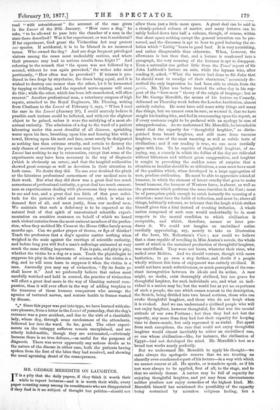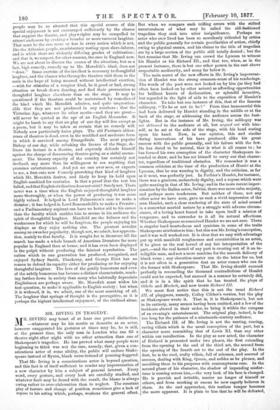MR. GEORGE MEREDITLI ON LAUGHTER.
TT is a pity that the daily papers, if they think it worth their while to report lectures—and it is worth their while, every paper counting many among its constituents who are disappointed if they find in it no subject of thought but politics—should not
allow them just a little more space. A great deal can be said in a closely-printed column of matter, and many lectures can be safely boiled down into half a column, though, of course, within that short space nothing except the general intention can be pre- served, and the discourse is apt to bear to good lecturing the re- lation which " Liebig "bears to good beef. It is very nourishing, and rather disagreeable than otherwise. When, however, the allowance is less than that, and a lecture is condensed into a paragraph, the very meaning of the lecturer is apt to disappear. Even a naturalist can gather little from the Times' report of Sir John Lubbock's lecture on ants, while the layman who, after reading it, asked, "What the insects had done to Sir John that he should want to smudge all their characters," accurately de- scribed the only impression he had been able to obtain from the précis. Mr. Tylor was better treated the other day in his sup- port of the " bow-wow" theory of the origin of language ; but as for Mr. George Meredith, the aroma of his lecture on Comedy, delivered on Thursday week before the London Institution, almost entirely exhales. He must have said some witty things and many fine things, but we cannot even be sure, as we read it, that we have caught his leading idea, and feel in commenting upon the report, as if every sentence ought to be prefaced with an apology in case of misapprehension. As we understand Mr. Meredith, he intended to insist that the capacity for "thoughtful laughter," as distin- guished from broad laughter, and still more from vacuous laughter, is one of the most unerring as well as subtle tests of civilisation ; and if our reading is true, we can most cordially agree with him. To be capable of thoughtful laughter, of en- joying, say, a comedy in which the follies of the day are ridiculed without bitterness and without gross exaggeration, and laughter is sought in provoking the sudden sense of surprise that a situation so familiar should be so ridiculous, a man must have most of the qualities which, when developed in a large aggregation of men, produce civilisation. He must be able to appreciate a kind of humour, in which the element of latent cruelty that goes to make broad humour, the humour of Western farce, is absent, as well as the grossness which performs the same function in the East ; must be of perception quick enough to catch instantly the meaning of a situation ; must have the habit of reflection, and must be, above all things, habitually tolerant, so tolerant that the laugh which strikes himself gives him a hint instead of creating irritation. A whole nation composed of such men would undoubtedly be in most respects in the mental condition to which civilisation is acceptable, and which, therefore, sooner or later pro- duces it. We could not imagine an uncivilised nation cordially appreciating, say, merely to take an illustration of the hour, Mr. Robertson's Caste ; nor could we believe that a class capable of revelling in Miss Austen's novels, the whole merit of which is the sustained production of thonghtful laughter, was uncivilised. They were not boors, whatever their vices, who smiled over Moliere. And we should venture, though with more hesitation, to go even a step farther, and doubt if a people wholly without this form of enjoyment was entirely civilised. It could not have much reflectiveness, or much perception of the con- stant incongruities between its ideals and its action. A race might, no doubt, exist thoroughly civilised, but too grave for thoughtful laughter, for such individuals are, and what an indi- vidual is a nation may be; but the world has as yet no experience of such a people, the one which comes nearest to the description, the Scotch, being divided into two broad sections, those who can
evoke thoughtful laughter, and those who do not laugh when it is evoked. And we can understand a sivilised people who will not enjoy laughter, however thoughtful, for that was the mental attitude of our own Puritans ; but then they had not lost the capacity, any more than they had lost their capacity for keeping time to dance-music, but only repressed it as sinful. But apart from such exceptions. the race that could not enjoy thoughtful laughter would almost inevitably be either an uncivilised one, or one whose civilisation—like, for instance, the civilisation of Egypt—had not developed the mind. Mr. Meredith's test as a broad test works nearly perfectly.
But we understand Mr. Meredith to apply his thought—We make always the apologetic reserve that we are trusting an
absurdly over-condensed report of his lecture—in a way with which
we cannot concur at all. He speaks, or is madeto speak, as if hb test were always to be applied, first of all, to the stage, and to that we entirely demur. A nation may be fall of capacity for enjoying thoughtful laughter, and yet may from circunistancts neither produce nor enjoy comedies of the highest kind. Mr.
Meredith himself has mentioned the possibility of the capacity being restrained by mistaken religious feeling, but a
special enjoyment is not encouraged sufficiently by the classes that support the theatre, and playw rights may be compelled to attract audiences by evoking a broader or more vacuous laughter. That must be the case more or less in every nation which is not, like the Athenian people, an aristocracy resting upon slave-labour, and in which there are violently differing grades of cultivation ; and that is, we suspect, for other reasons, the case in England now. We are not about to discuss the causes of the situation, but as a fact, high comedy, comedy up to Mr. Meredith's ideal, does not "draw." Some exercise of the intellect is necessary to thoughtful laughter, and the classes who throng the theatres visit them in the main in the hope of being amused without intellectual exertion, —wish for stimulus of a rougher kind, be it good or bad, strong situation or break-down dancing, and find their provocation to thoughtful laughter elsewhere than on the stage. It may be questioned if the theatres could be maintained by comedies of the kind which Mr. Meredith admires, and quite unquestion- able that they are not produced in any numbers ; that the Victorian Age, whatever its other merits—and they are great— will never be quoted as the age of an English Menander. It might be harsh to say that no play of our day will live except as a poem, but it may be taken as certain that no comedy will. Nobody now particularly hates plays. The old Puritanic abhor- rence of theatres is dead, even in the modified and moderate form in which it survived among Evangelicals. The most popular Bishop of our day, while rebuking the licence of the Stage, de- livers his lecture in a theatre, and expressly defends himself against the charge of denouncing theatre-going as a sinful amuse- ment. The literary capacity of the country has certainly not declined, any more than its willingness to see anything that promises entertainment. And yet no one ever sees, or expects to see, a first-rate new Comedy provoking that kind of laughter which Mr. Meredith desires, and likely to keep its hold upon English mankind for centuries. Is that a proof that the test has failed, and that English civilisation does not exist? Surely not. There never was a time when the English enjoyed thoughtful laughter more thoroughly, or when the power of producing it was more highly valued. It helped in Lord Palmerston's case to make a dictator ; it has helped in Lord Beaconsfield's to make a Premier ; and a Parliamentary aspirant can have no better aid to his career than the faculty which enables him to arouse in his audience the spirit of thoughtful laughter. Manifold are the failures and the weaknesses for which he will be forgiven, the people enjoying his displays as they enjoy nothing else. The greatest novelist among us owes her popularity, though not, we admit, her apprecia- tion, mainly to that faculty. It is sought for in literature till the search has made a whole branch of American literature far more popular in England than at home, and it has even been displayed in the pulpit without producing the faintest reprobation. The nation which in one generation has produced, recognised, and enjoyed Sydney Smith, Thackeray, and George Eliot has no reason to defend its capacity either for producing or for enjoying thoughtful laughter. The love of the gently humorous and even of the subtly humorous has become a distinct characteristic, reach- ing farther down in society than many who habitually depreciate Englishmen are perhaps aware. Mr. Meredith must widen his test-question, to make it applicable to English society ; but when it is widened, it is, we admit, one of the most searching of alL The laughter that springs of thought is the prerogative, as it is perhaps the highest intellectual enjoyment, of the civilised alone.



































 Previous page
Previous page